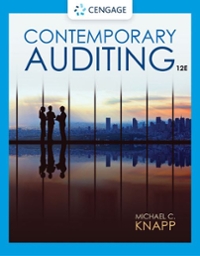No, that's okay, Bea. I'll write that memo this weekend and send it to Mr. Fielder. You
Question:
"No, that's okay, Bea. I'll write that memo this weekend and send it to Mr. Fielder. You go on home."1
"Are you sure, Chuck? I don't mind staying a while longer."
"Thanks, Bea, but you've already put in too much overtime this week." After he sent his secretary home, Charles Tollison spent several minutes shuffling through the audit workpapers and correspondence stacked on his desk, trying to decide what work he would take home over the weekend. Finally, only one decision remained. Tollison couldn't decide whether to take the inventory file with him. Compulsive by nature, Tollison knew that if he took the inventory file home, he would have to complete his review of that file, which would increase his weekend workload from six hours to more than 12 hours. As he stewed over his decision, Tollison stepped to the window of his office and idly watched the rush-hour traffic on the downtown streets several stories below.
It was nearly 6:30 on a Friday evening in early August. Charles Tollison, an audit manager for a large international accounting firm, had suffered through a tough week. His largest audit client was negotiating to buy a smaller company within its industry. For the past two months, Tollison had supervised the fieldwork on an intensive acquisition audit of the competitor's accounting records. The client's chief executive officer (CEO) suspected that the competitor's executives had embellished their firm's financial data in anticipation of the proposed buyout. Since the client was overextending itself financially to acquire the other firm, the CEO wanted to be sure that its financial data were reliable. The CEO's principal concern was the valuation of the competitor's inventory, which accounted for 45 percent of its total assets.
The client's CEO had requested that Tollison be assigned to the acquisition audit because she respected Tollison and the quality of his work. Normally, an audit manager spends little time "in the trenches" involved in the day-to-day audit procedures.
Because of the nature of this engagement, however, Tollison had felt it necessary to spend 10 hours per day, six and seven days per week, poring over the accounting records of the takeover candidate with his subordinates.
As Tollison stared at the gridlocked streets below, he was relieved that the acquisition audit was almost complete. After he tied up a few loose ends in the inventory file, he would turn the workpapers over to the audit engagement partner for a final review.
Tollison's tough week had been highlighted by several contentious meetings with client personnel, a missed birthday party for his eight-year-old daughter, and an early breakfast Thursday morning with his office managing partner, Walker Linton. During that breakfast, Linton had notified Tollison that he had been passed over for promotion to partner-for the second year in a row. The news had been difficult for Tollison to accept.
For more than 13 years, Tollison had been a hard-working and dedicated employee of the large accounting firm. He had never turned down a difficult assignment, never complained about the long hours his work required, and made countless personal sacrifices, the most recent being the missed birthday party. After informing Tollison of the bad news, Linton had encouraged him to stay with the firm. Linton promised that the following year he would vigorously campaign for Tollison’s promotion and “call in all favors” owed to him by partners in other offices. Despite that promise, Tollison realized that he had only a minimal chance of being promoted to partner. Seldom were two-time “losers” ticketed for promotion.
Questions
1. Do you believe Charles Tollison was qualified for a partnership position with his firm? Explain.
2. Did Tollison's firm treat him "fairly"? Why or why not?
3. Identify the criteria you believe large international accounting firms should use when evaluating individuals for promotion to partner. In your opinion, which of these criteria should be most heavily weighted by these firms? Should smaller accounting firms establish different criteria for evaluating individuals for promotion to partner? Explain.
4. Discuss the advantages and disadvantages of the "up or out" promotion policy followed by many accounting firms.
Step by Step Answer:






